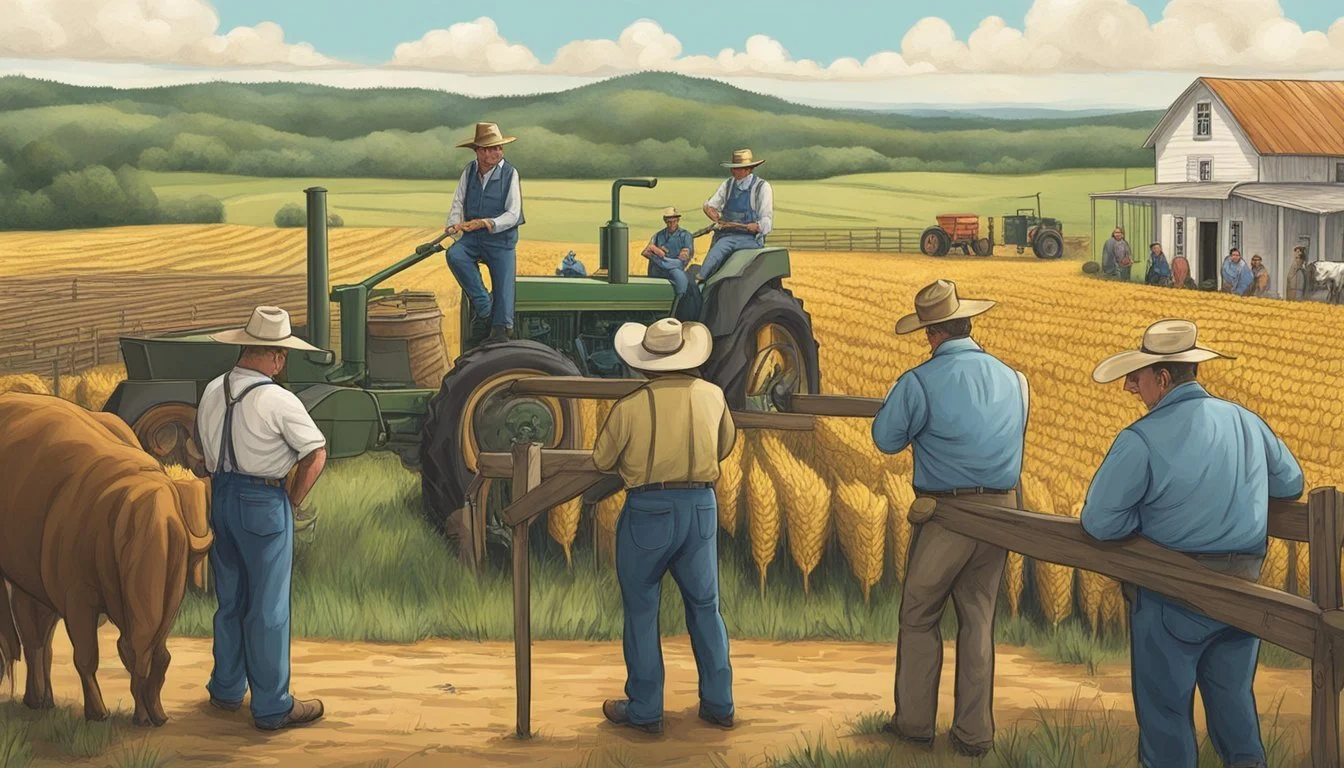Right to Farm Law in Tennessee
Understanding Agricultural Protections
The Right to Farm Law in Tennessee, codified as Tennessee Code section 43-26-101, seeks to protect agricultural operations from nuisance lawsuits. The legislation recognizes the importance of agriculture as an essential part of Tennessee's economy and culture. Through this act, the state offers farmers certain legal protections, aiming to ensure that agricultural practices can continue to sustain and develop free from unwarranted litigation that might arise from the normal course of farming operations.
Enacted in 1982, the Tennessee Right to Farm Act defines what constitutes a "farm" and protects farmers by stating that non-negligent agricultural operations cannot be deemed public or private nuisances. This legislation safeguards established farms against complaints from newer residents who may move into a rural area and then object to the inconveniences associated with normal farming activities. The intention is to prevent urban encroachment from eroding the viability of agricultural lands and operations.
As agricultural landscapes and practices evolve, the Right to Farm legislation continues to be a subject of discussion among stakeholders. The act takes into account ongoing agricultural activities, providing a legal framework that supports the preservation of farm lands and the agricultural heritage of Tennessee, which is seen as critical to the state's identity and economy.
Historical Background
The Right to Farm laws in the United States emerged in the late 1970s, primarily as a response to the growing encroachment of suburban development on agricultural land. In Tennessee, the legislators recognized the significance of protecting the rights of farmers and ensuring the longevity of agricultural operations within the state. This led to the proposal and enactment of the Tennessee Right to Farm Act in 1982.
The primary purpose of these laws, including Tennessee’s, was to shield farm operations from nuisance lawsuits, which could arise from new neighbors unfamiliar with the realities of agricultural practices. They served to legitimize and prioritize agricultural activities by preserving existing farms and enhancing their legal protections.
The Tennessee Right to Farm Act was also a recognition of the state’s deep connections to agriculture. Tennessee's economy has been historically rooted in agriculture, with farms contributing significantly to the state’s cultural and economic fabric. By the time these laws were instituted, it was clear that the state valued its agricultural heritage and sought to prevent the loss of farm lands to non-agricultural uses.
Key Points of Tennessee Right to Farm Law:
Protection Against Nuisance Suits: The law embodies the "coming to the nuisance" doctrine, meaning individuals who move into an area near an established farm cannot sue for ordinary nuisances typically associated with farming.
Preservation of Farmland: The act aims to prevent the permanent loss of farmland due to urban sprawl and development.
Statutory Definitions: Under the act, a "farm" is defined to include the land, buildings, and machinery used for commercial production of farm products.
However, since the law's inception, Tennessee has witnessed a decline in both the number of farms and the acres of farmland, thus emphasizing the ongoing challenge of preserving agricultural spaces in a developing landscape.
Scope and Definitions
The Right to Farm Law in Tennessee encompasses specific definitions and applicable regulations critical to agricultural operations within the state. These legal interpretations are pivotal for farmers, legislators, and the judiciary in understanding and executing the law.
Key Definitions
Under the Tennessee Code, agriculture is broadly defined, including traditional farming activities and more specialized forms of cultivation and animal husbandry. Key terms include:
Farm: It refers to the land, buildings, and machinery used in commercial production.
Farm Products: These are products of the farm, such as fruits, vegetables, poultry, dairy, feed, fiber, fur, and other goods derived from horticulture, livestock, etc.
Nursery Stock: A classification for plants, trees, and other horticultural products intended for sale.
Agriculture: Encompassing farming operations ranging from the cultivation of food, fiber, and nursery stock, to the raising of livestock, poultry, and hemp.
Applicability of the Law
The Tennessee Right to Farm Act is applicable to all farming operations within the state that meet the definitions outlined in Tennessee Code Ann. §§ 43-26-101 to 43-26-104. Its provisions apply to commercial producers of farm products, ensuring that their operations are protected under state law.
Covered Activities
Activities protected under this law include, but are not limited to:
Cultivation and tillage of the soil.
Production of vegetables, fruits, trees, and any other horticulture commodities.
Rearing of livestock, poultry, and dairy.
Commercial production of hemp.
Production for the production of food, fiber, feed, or nursery stock including fur.
The Right to Farm Law in Tennessee aims to safeguard such agricultural endeavors from nuisance lawsuits and undue restrictions, promoting a viable future for farming within the state.
Protections Offered
Tennessee's Right to Farm Law is designed to shield farm operations from nuisance lawsuits, providing a legal safeguard for agricultural enterprises. This legislation affirms the legitimacy of farms' commercial activities and mitigates the risk of conflicts arising from non-agricultural property development.
Protection Against Nuisance Lawsuits
The Tennessee Right to Farm Act specifically aims to protect farm operations from being deemed nuisances after the fact, if they were not so at the time they commenced. This protection extends to various conditions that could be construed as nuisances by neighboring non-farming properties, such as noise or pollution. Essentially, if a farming operation is lawful and was established before any surrounding non-agricultural developments, it typically cannot be subjected to a nuisance lawsuit on those grounds.
Key protections against nuisance lawsuits include:
Presumption against nuisance: Farms operating before the development of surrounding non-agricultural properties are generally presumed not to be a nuisance.
Change in Conditions: If non-farming land develops around existing agricultural operations, these farms are still protected under the Right to Farm statutes.
Presumed Legality of Farm Operations
Legitimate farm operations are presumed to be legal under the Right to Farm Act, provided they adhere to good agricultural practices and are compliant with other relevant statutes and regulations. This presumption plays a fundamental role in the statute, as it establishes the baseline acceptance of farming as a lawful use of property within Tennessee.
The statute secures the position of farm operations in a legal context:
Definition of Farm: A farm in Tennessee encompasses the land, buildings, and machinery used in the commercial production of farm products.
Established Legal Framework: Farm operations have a recognized legal framework that ensures their activities, when conducted within the bounds of the law, are acknowledged as permissible and vital to the state's economy and cultural heritage.
Limitations and Restrictions
Tennessee's Right to Farm Law, found in the Tennessee Code under §§ 43-26-101 to 43-26-104, establishes legal protections for farming operations from nuisance lawsuits. However, it includes certain limitations and restrictions that are crucial for balance between agricultural and non-farming interests.
The statute specifies that a farming operation must be established prior to the surrounding non-agricultural activities to receive protection. Moreover, it should not be a result of a change in the land use or condition. If such operations were negligent, causing harm to public health and safety, they would not be protected under the Right to Farm Law.
Operations that contribute to pollution or noise may be subjected to restrictions if they are deemed to operate in violation of state law or regulation. This includes making sure that farming practices adhere to environmental standards.
Entities such as counties cannot regulate agricultural activities through zoning, which restricts their ability to control the location and expansion of farms. This prohibition, however, does not extend to:
Building permits: Counties cannot require permits for agricultural buildings, but structures must meet certain conditions.
Farms presumed not nuisances: While farms are presumed not nuisances, this does not prevent all legal actions against them, especially if operations cease to be conducted in a manner consistent with good agricultural practice.
While the Right to Farm Act is a robust statute designed to protect Tennessee farmers, it does not provide blanket immunity. It balances the interests of agricultural producers with those of their neighboring property owners by enforcing limitations that ensure the agricultural activities are conducted responsibly, with respect to the environment and public health.
Legal Framework
Tennessee's Right to Farm laws provide a vital legal structure, protecting farm operations from nuisance lawsuits. These laws are primarily codified under Title 43, Chapter 26 of the Tennessee Code.
Statutory Provisions
The Tennessee Right to Farm Act is found in Tenn. Code Ann. §§ 43-26-101 to 43-26-104. Under this statute, the Act's short title is stated in § 43-26-101, which may be cited as the "Tennessee Right to Farm Act." The law includes vital definitions in § 43-26-102, clarifying terms essential for legal interpretations, such as what constitutes a "farm." The Act ensures that farm operations are presumed not to be public or private nuisances, a vital protection for ongoing agricultural practices.
Amendments and Updates
Amendments to this body of law are critical to its evolution and the reflection of current agricultural concerns. Through Chapter 598 of the 2022 Regular Session, updates to the Right to Farm laws were effected, ensuring the statute stays current with agricultural advancements and societal needs. These updates can affect the applicability of the law to contemporary farming practices, including the rise of urban farming and changes in technology or farming methods.
Conflict Resolution
In Tennessee's Right to Farm Law, resolving conflicts primarily hinges upon testimonial evidence and established enforcement mechanisms. Conflicts usually arise when non-farming residents file nuisance lawsuits against farms, and the resolution process determines whether farming operations can continue without legal impediments.
Role of Legal Testimony
Legal testimony plays a crucial role in resolving disputes under the Right to Farm statutes. In these cases, individuals provide testimony to support claims of nuisance or defend farming practices. The credibility of testimonial evidence often influences the outcome of the lawsuit. Expert testimony from agricultural specialists can be pivotal, as it helps to ascertain whether the farm operation is compliant with accepted farming practices.
Enforcement Mechanisms
The enforcement mechanisms within the Right to Farm Law ensure compliance and address violations. If a farm operation is deemed a nuisance, enforcement actions can range from cessation orders to fines. Conversely, the law also provides farms with a defense against nuisance lawsuits if they adhere to generally accepted agricultural practices. To enforce these statutes, local authorities may inspect the premises and assess conditions, while courts interpret the law to make rulings on disputes.
Impact and Public Reception
Tennessee's Right to Farm Law has shaped the agricultural landscape and elicited varied reactions from the public and media. Its provisions touch upon critical aspects of farming practices and land use, while also intersecting with societal views on rural economic development and environmental stewardship.
Impact on Agricultural Practices
The legislation has been instrumental in defending farm operations against nuisance lawsuits, thereby reinforcing the viability of agricultural practices that are customary to farming. It emerged as a protective measure for farmers, especially in light of urban expansion and the associated pressures on farmland. Since its enactment, there has been a notable decline in the number of farms and farmland area, which could suggest secondary effects of the law possibly related to economic and market forces in the agricultural sector.
Impact on Farm Numbers: Decrease by 23% since 1982
Impact on Farmland Area: Decrease by 13% since 1982
Media and Public Perception
The media coverage and public discourse surrounding Tennessee's Right to Farm Act have been multifaceted, reflecting a broad spectrum of opinions. While the act is often cited as a pillar for safeguarding farming activities, it has also faced scrutiny in terms of its implications for community planning and environmental concerns.
Media Focus: Balance between protecting farms and addressing non-agricultural community interests
Public Discourse: Dialogues between support for farmer rights and exploration of the law's long-term implications for land use
In terms of agriculture and horticulture, the law has affirmed a certain level of autonomy for farm owners, but the changing agricultural landscape has prompted news outlets and media to question the effectiveness of the law in preserving farming in the state. The act remains a significant subject of discussion among stakeholders in Tennessee's agricultural future.
Comparative Analysis
This section offers a detailed comparative analysis of Right-to-Farm laws, examining Tennessee's statutes in parallel with similar legal constructs in other states as well as at the national level.
Similar Laws in Other States
In the landscape of agricultural legislations, Right-to-Farm (RTF) laws are enacted by states to protect qualifying farmers and ranchers from nuisance lawsuits, preserving agricultural land and encouraging the sustainability of farms in rural areas. While Tennessee's RTF law was established to prevent farmland loss, each state's law varies with respect to the level of protection afforded to agriculture.
Missouri, for example, amended its constitution to guarantee farmers and ranchers the right to engage in farming practices without interference from new laws and regulations.
California, in contrast, applies its RTF laws alongside stringent environmental regulations, balancing agricultural interests with environmental protection.
National Right-to-Farm Policies
At the national scale, The National Agricultural Law Center serves as a key resource for comprehensive agricultural laws, including RTF statutes. RTF laws across the United States share common elements but differ based on state-specific concerns, historical developments, and legal precedents. Research publications indicate that while these laws broadly defend agricultural activities, challenges such as environmental injustice and the interests of large-scale corporate farms versus smaller operations remain hotly debated topics.
The Agricultural Act of 2014 at the national level, widely known as the Farm Bill, includes provisions that influence RTF laws, though it does not directly impose a uniform RTF policy.
According to academic research, national policies set a framework within which state RTF laws operate to support the agricultural sector, showcasing an intersection of regulation and common law with corporate power in the farming industry.
Resources
This section provides invaluable materials for anyone seeking an in-depth understanding of Tennessee's Right to Farm Law. It directs readers to reliable sources for further research and legal statutes.
Research and Information
For researchers seeking comprehensive insight into the specifics of the Right to Farm Law in Tennessee, the Tennessee Farm Bureau and One Rural offer substantial background information. These sources can provide researchers with access to a chart detailing the provisions of the law and a map illustrating its geographical implications across Tennessee. The Bureau's resources are particularly useful for academic or policy research, as they might include historical data and a compilation of relevant agricultural regulations.
Legal References
As for legal references, the primary state laws concerning Tennessee's Right to Farm can be found under Tennessee Code Annotated §§ 43-26-101 to 43-26-104. Legal professionals and individuals can refer to Justia Law for the current text of these statutes. For up-to-date legal information, it's important to note that any compilation of laws should be confirmed as the latest version, as the Tennessee legislature may have passed recent amendments. The National Agricultural Law Center also provides a digest of Right to Farm statutes, which were last updated through the 2022 Regular Session, but users should verify if there have been subsequent updates. The Center's documentation, although it may not include Maine's provisions, will be a pertinent reference for anyone investigating comparative agricultural legislation.









